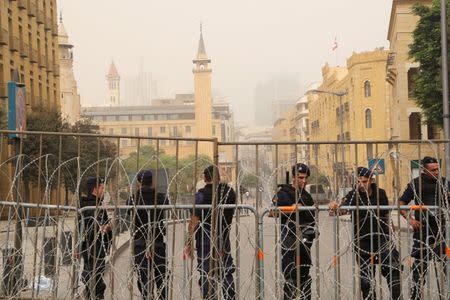Lebanon's paralysed parliament tackles finance at first session in a year
By Laila Bassam and John Davison BEIRUT (Reuters) - Lebanon's parliament held its first legislative session in more than a year on Thursday and started passing financial laws the paralysed state urgently needs to stay afloat. Thorny political issues were left off the agenda, with the focus primarily on development loans, debt issuance and banks, but one party still walked out, underlining the divisions that continue to stall progress. The Middle East's only Christian presidency has been vacant since May 2014 because lawmakers cannot agree on a candidate. Lebanese politics has long been dogged by sectarian rifts and personal rivalries but the war in neighbouring Syria has exacerbated them even further. "Everyone is suffering," Riyad Taljeh, one of the many exasperated citizens on the streets outside told Reuters. "There is no president, the country is in the middle of a political wrestling and all of this is piling up. Everyone is ignoring these problems and we are swept away in the wind." The country, which hosts more than a million refugees from the Syrian war, risks losing millions of dollars in World Bank development loans which parliament needs to approve by year-end. MPs, who met following pressure from international bodies and their own central bank, approved several laws including one law permitting the government to borrow more in foreign currency. Lebanon is one of the most heavily indebted countries in the world, with a ratio of overall debt to gross domestic product (GDP) at around 140 percent. Trans-border cash movements, cooperation to fight tax evasion and amendments to the money laundering law were also high on the agenda at the two-day session, as was a law to release additional funds to pay public sector wages. REGIONAL RIVALRIES Politics has long been complicated by competition between regional powers who have a decisive influence over rival Lebanese factions. The current barely-functioning unity government headed by Prime Minister Tammam Salam includes both Hezbollah, which is backed by Iran, and Saad al-Hariri's Future Movement, backed by Tehran's regional rival Saudi Arabia. Iran and Saudi Arabia also back opposing sides in the Syrian war. Lebanon's main political blocks had previously been unable to agree on an agenda, obstructing efforts to convene the chamber. Some parties were still threatening a boycott until late on Wednesday. In a sign the political impasse would remain difficult to break, one Christian party walked out of parliament at the beginning of the session, objecting to the passing of laws without a president in office. Under an agreement that ended Lebanon's civil war, the president must be a Christian. "This session is unconstitutional (and) illegitimate," Kataeb party leader Sami Gemayel said in front of supporters protesting outside afterwards. Politicians have failed to agree on even basic decisions, including where to dump rubbish. (Additional reporting by Mariam Karouny; Editing by Raissa Kasolowsky and Andrew Heavens)

 Yahoo News
Yahoo News 

